My Superpower Is Being Alone Forever
by Joe Berkowitz and Joanna Neborsky

It’s pretty hard to reverse engineer a meet-cute. These things either happen or they don’t. If you were really serious about it, you could probably arrange for, say, an errant shopping cart to go charging off in someone’s direction and then you could rush up behind it saying, “Sorry, sorry!” and that’s how you’d meet, but then you’d have to live with yourself for the next 50 years or so, knowing that, basically, you’re Elmer Fudd. Sometimes when a radiant single lady comes floating along the sidewalk like a dream, I think about stopping her. But I never would. It just seems as intrusive as a catcall — or an errant shopping cart. I might as well be passing out handbills for a shady-sounding sample sale. So instead I say nothing and then she’s gone. We won’t be accidental seatmates at a dinner party later. It’s a missed non-connection, a moment less significant than if we’d been on line together at Whole Foods buying the same artisanal sherbet. How-we-met stories are overrated, anyway.
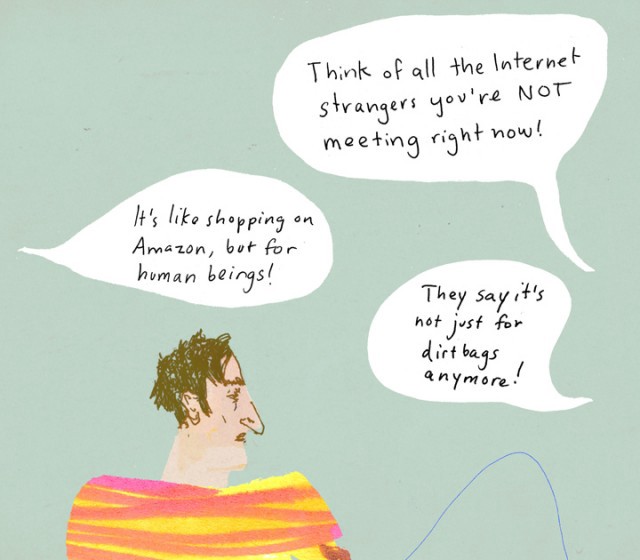
When you’ve been single for longer than a pregnancy term, the people who love you start to get concerned. They begin to wonder whether you’ll ever impregnate anyone. Pretty soon they’ll ask some pointed questions about online dating. It doesn’t matter whether you’re single by choice or if you just lie and say you are, some Good Samaritan will always nominate the Internet as the answer to your problems (because you definitely have problems). Any resistance you show might stem from a previous experience with online dating, or from a novice’s view that these websites constitute some sort of Matrix of Loneliness, connecting romantic undesirables and allowing them to mingle badly. Either way, no single answer will ever satisfy the person doing the persuading. The last time I had to explain my aversion to online dating, I surprised myself by agreeing to try it out (again). It seemed like the easiest way to end the conversation.
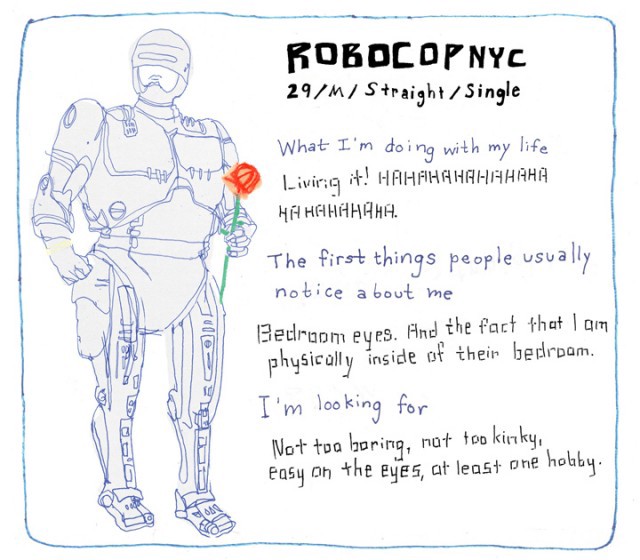
Putting together a dating profile means performing a self-autopsy and reassembling the pieces into Sexy Robocop. You save what’s worth salvaging and shield the damaged parts with reinforced metal. You strive to find the middle ground between showing you have nothing to hide, and just showing off. You carefully curate your interests as if they were co-op displays in a Barnes & Noble, reveling in the understated complexity of liking both Nicki Minaj and My Bloody Valentine. Your picture gallery broadcasts a series of defensive messages: “See? Other females aren’t afraid of me.” “See? I go to museums sometimes and mimic sculpture-poses because Culture.” “See? I’ve been to a Halloween party so obviously I don’t spend much time alone, crying to The Cure’s Disintegration LP and drinking wine from a can.” Dating profiles reveal more about how you see yourself than how you really are, and more about how you want to be seen than how you will be.
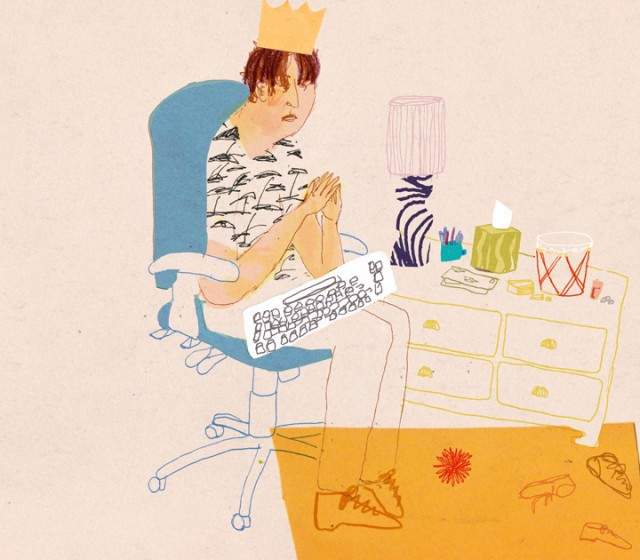
With infinite choice comes infinite opportunities to judge. The more options that exist, the pickier you become. Scrolling through profile after profile, I am transformed into an imperial king, surveying his goodly townsfolk from a balcony on high. Those with minor perceived flaws are summarily dismissed (“Next!”) because surely someone closer to the Hellenic ideal is just around the corner. Anyone cute might be cast aside for the smallest breach of taste: a penchant for saying things like “I love life and I love to laugh” or self-identifying as “witty.” Yet even when I genuinely find myself attracted to someone, I’ll still react with skepticism. What’s the catch? What dark and terrible secret causes her to resort to this thing I am also doing? After scanning closely for red flags and finally deigning her regally worthy, I dispatch a message. But then the truth reveals itself: the king is not her type and also he is not really a king.
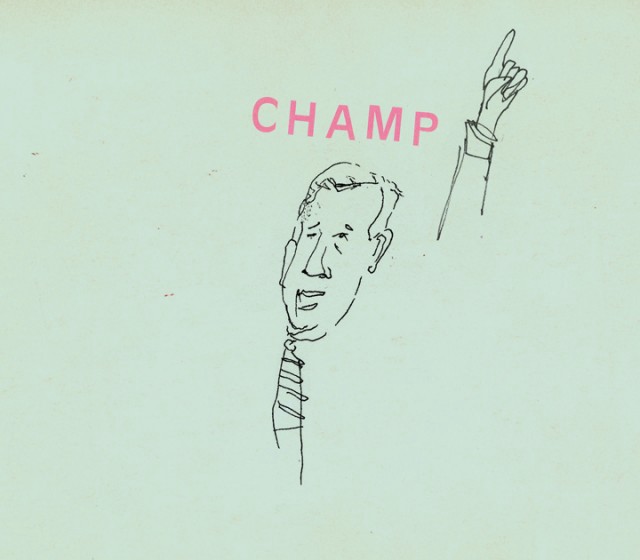
Messaging strangers on a dating site is a great way to dabble in Glengarry Glen Ross-style competitive salesmanship. Every hot lead is sure to have already attracted a multitudinous horde of Al Pacinos and Jack Lemmons offering the same bill of goods. You’re all sharing space together in an overstuffed inbox, so words need to be chosen wisely. Asking questions about a prospect’s profile is one way to go — except she probably wrote it months ago and so mentioning her affinity for Frank’s Red Hot now seems as dopey as it probably should. Another option is asking nonsense questions, like who’d win in a fight between Matt Lauer and Brian Williams. (Advantage: Williams.) Since such questions aren’t specific to each lady, though, she’ll probably assume you’re cutting and pasting, and let’s face it — you probably are. When an opening salvo goes sour in person, you can always keep talking. Online, you just get ignored forever. You can send a follow-up later on (“Do you HATE having an awesome time with handsome gentlemen?”) but that smacks of Jack Lemmon-level desperation.
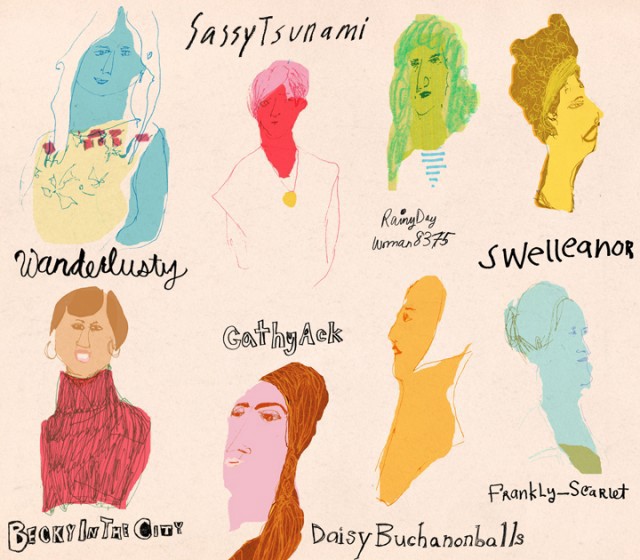
The only way for me to do this without ending up in an existential tailspin is to not take it too seriously. If low expectations can elevate so-so movies, perhaps they can also upgrade one’s dating life from a graveyard to at least a fancy graveyard with picturesque views and atmosphere and motorized carts for the infirm. But even casual maintenance of an Internet dating presence requires sending out the odd message, responding to same, and internalizing the byzantine rules about which topics are off-limits and when to take things offline. It’s a hefty time-suck and it makes it hard to keep up the illusion that this is all just a lark. But if I never get my hopes up, nobody can accuse me of being too invested in the outcome. That way, when we actually do end up liking each other, it will feel more like something that just sort of happened — rather than the result of actively engaging in an organized simulacrum of human mating rituals. “Whoops, I seem to have tripped over my laptop and subsequently bumped into you on the Internet!”
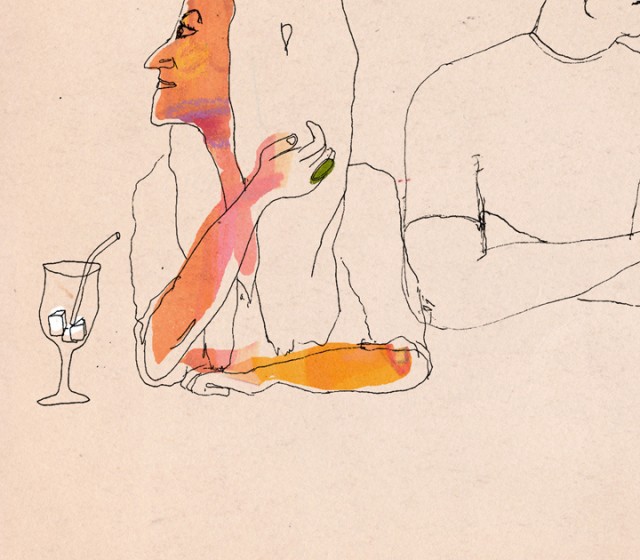
Some dates wheeze to a quiet end the moment you encounter each other in person. Then there’s still a whole night ahead to squirm through. A bad date, at least, leaves you with a fun new story about how everybody’s always a nightmare; a mediocre one offers just enough of a good time so that nobody face-plants the table. Going through the motions on a date feels like interviewing for a job you don’t want strictly to keep a parole officer off your back. The more such dates you go on, the more they echo each other and blend together into one amorphous person who’s into Wet Hot American Summer and brunch at Buttermilk Channel, but still incompatible with you somehow. Other times, it’s you who’s the problem. You say one dumb thing (“I would be incredibly easy to blackmail”) and it’s a deal breaker. The disappointment of not being chosen, however, is almost preferable to the Fellini-style ennui of manufacturing chemistry with someone whose interests map well to yours while every moment becoming less certain whether that’s what you even want.
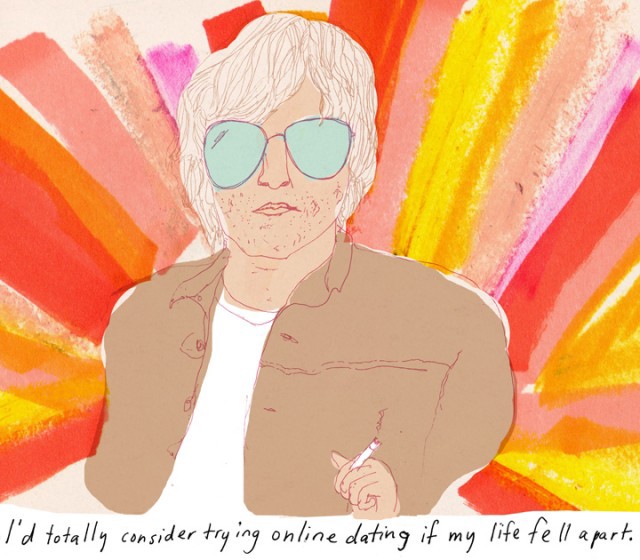
Everyone has a friend who is so charismatic, brilliant or good-looking that the idea of him or her trolling OKCupid is mind-boggling. I am haunted by those friends. What is it that separates us? Is it gluten? I’m at peace with the fact that Drake sings about how jaded he is from being constantly propositioned by beautiful women — because Drake is crazy-famous. My friends who’d never be mistaken as online daters are not famous, but they also possess some ineffable quality that makes them forever F-able. As far as our social sphere is concerned, they might as well be Drake (or nearest female equivalent): They’re stars, and finding them on a dating site would create cognitive dissonance of Orwellian proportions. Personally, I’ve never felt as spectacularly anonymous as I have as an online dater, united with everyone else on the site in that we all have a reason to be there. I can rationalize about Internet dating for days. I can think up reasons for why the way my grandparents met is outmoded. But I don’t want any woman to think she was my last resort, and I don’t want to imagine that I was hers. When we say, “I’m so glad we found each other,” I don’t want it to refer to the way we had to find each other like hidden files in a hard-drive search.
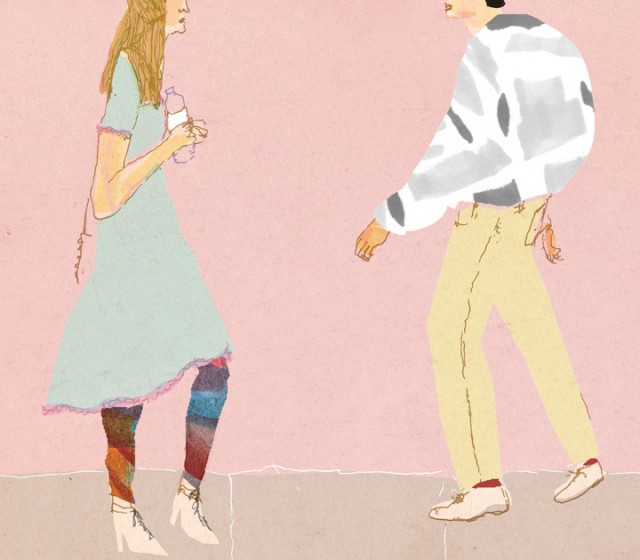
Sometimes a person of interest will disappear from your online dating correspondence, as if whisked away by the Rapture. You just notice they’re suddenly gone and you’re left behind, exactly as Kirk Cameron predicted. The nature of online dating is ephemeral and temporary. It is designed to end and, one way or another, it will; either with a Mission Accomplished banner or an AWOL report. The longer your adventure goes on, the more you start rooting for every attractive person you meet to become the reason you will delete your profile. “I tried it for a while but then I met my lover on the subway,” is what you’d ideally say. Minus the word ‘lover.’ People always swear you only meet someone when you least expect it, which is not entirely true because you least expect it when you’re dead asleep and, personally, I’ve never been rustled out of bed by a stranger who became my new girlfriend. What if you always expect it when you’re supposed to least expect it? Relentlessly checking people out in the checkout aisle, walking down the street trying to force eye contact. Maybe then you gradually give up on Internet dating without canceling your account, and the most expected approach to meeting people somehow manages to surprise you. The person of your dreams reaches out to the profile you forgot you had, and it’s such a good fit that the way you met doesn’t even matter. It could totally happen! It just probably won’t! On the upside, I hear your grandmother has found someone perfect for you. She’s a Taurus with a soft spot for pugs, and she’s going back for her MBA.
Joe Berkowitz (text) edits books and writes stuff. He also has a tumblr.
Joanna Neborsky (art) is an illustrator living in Brooklyn. She makes books and animations about books.
Toe Gets Promoted To Thumb
“A man who accidentally cut off his thumb has had his big toe attached in its place by surgeons.” I have… some questions, the most pressing probably being, “Do we call it a toethumb or a thumbtoe?” But there are definitely others.
Is Sinead O'Connor Going to Be a Popular Musician Again?
That’s the first release of the album version of “Take Off Your Shoes.” And here’s a recent demo version of “Reason With Me.” Interesting things are (at last) happening! (The full album is now allegedly being released in 2012.)
(Also if you’re not reading her website you’re missing out on all sorts of acting out and lewd talk, plus her two good-looking man-nannies.)
Jew App Riles Frogs
“Computer giant Apple could face legal action in France over an iPhone app which tells users whether thousands of celebrities are Jewish or not. The application’s designer, who is Jewish himself, says he invented it for entertainment not racial profiling.”
The 33 Best Books Remaining on the Last Day of the Borders in the Time Warner Center
by Matthew Creamer
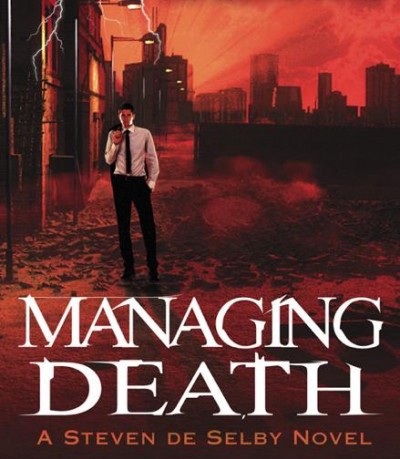
33. “Full Frontal Nudity: The Making of An Accidental Actor” by Harry Hamlin
32. “Dirty Sexy Politics” by Meghan McCain
31. “My Fair Succubi” by Jill Myles
30. “Sams Teach Yourself Foursquare in 10 Minutes” by Tris Hussey
29. “American Individualism” by Margaret Hoover
28. “Callous Disregard” by Andrew J. Wakefield. Foreword by Jenny McCarthy.
27. “Citizen U.S.A.: A 50 State Road Trip“ by Alexandra Pelosi
26. “Burning Up: On Tour With the Jonas Brothers” by Kevin, Joe and Nick Jonas
25. “Barrons’s ASVAB: Armed Services Vocational Aptitude Battery”
24. “ASVAB: Power Practice”
23. “ASVAB for Dummies”
22. “ASVAB Core Review”
21. “Beirut, I Love You” by Zena el Khalil
20. “Familyhood” by Paul Reiser
19. “Roseannearchy” by Roseanne Barr
18. “Unshapely Things” by Mark del Franco
17. “Bog Men: A Murder Mystery” by Joyce Keller Walsh
16. “Al Borde Del Apocalipsis” por Tim LaHaye y Craig Parshall
15. “El Pasaje” por Justin Cronin
14. “Christmas at Candlebark Farm” by Michelle Douglas
13. “The Falcon Prince” by Karen Kelley
12. “Society’s Most Disreputable Gentleman: The Man Who Ruins Reputations” by Julia Justiss
11. “Coming Back Stronger” by Drew Brees
10. “Play Baseball the Ripken Way” by Cal Ripken Jr., Bill Ripken and Larry Burke
9. “In the Time of Bobby Cox” by Lang Whitaker
8. “Do the Right Thing” by Mike Huckabee (audio)
7. “Real Wifey on the Grind” by Meesha Mink (audio)
6. “The Curse: Cubs Win! Cubs Win!… Or Do They?” by Andy Van Slyke
5. “Managing Death” by Trent Jamieson
4. “Deadline!: The Book” by Paula Tutman
3. “Suck on this Year” by Denis Leary
2. “Gone” by Lisa McCann
1. “The Brave” by Nicholas Evans
Matthew Creamer has lost to IBM’s Watson, survived a chemical weapons incinerator, gotten to the bottom of an urban legend in Alabama, and made it in and out of both Cuba and NYU legally. He is an editor at large at Ad Age and can be found on Twitter.
Ten Questions Parents Should Frantically Ask About Schooling
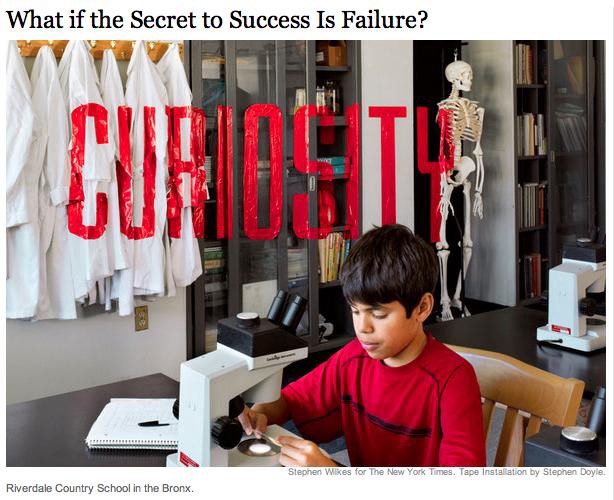
This coming weekend, the New York Times magazine looks at our children and what private and charter schools are doing for/to them! It raises so many questions for those of us who are concerned about our babies and if they will go to top-tier colleges after top-tier primary and secondary education, which is something you really do worry about especially if you’re dropping half a million on K-12 and then having to make a sizable donation to an Ivy League to make sure that little Crayson, Effexor and Randomly get to go to the right college! Here’s the top ten questions that a parent may form whilst reading this expose about the rise of “character evaluation” at… two schools. (One of whom is a charter, with a 33% college graduation rate of their first two classes.)
• What If Testing Well Means You’ve Failed the Real Test, Which Is Life?
• What If the 800 Is Actually a “Life Zero” on the SAT?
• What If America Has Lost Its Gumption from Competing Too Hard?
• What If Rewards are Actually Demerits, and We’re Also Punishing The Successful, Who Are Actually Cutthroat and Only Barely Empathetic?
• What If Everything We Value Is Wrong, and Years of Test Prep Are Holding MY BABY Back?
• What If Expensive Schools Are Hurting Our Baaaaabies???
• What If My Parenting Is Totally Broken But It’s Too Late???
• What If MY BABY Has to Choose Between Being Nice and Being Successful???
• What If My Child’s Charter School Is a Cult???
• What If We’re Raising a Generation of Horrible Robot Narcs??????
Crooked Former Cop Busted in Illegal Marmoset Sale
“A former Miami-Dade police officer, convicted of shaking down a motorist during a traffic stop, admitted Tuesday to violating his probation — because he got busted for allegedly hawking an illegally kept monkey.”
— Florida!
Bears Are Rubbing All Up On Your Internet
“Barry Ramsay, who owns a small manufacturing company here between two mountains, remembers the day his Internet connection crashed for several hours. Work crews had to ride up in snowmobiles to discover the problem. ‘They said that bears had been rubbing against the towers,’ Mr. Ramsay said. In this mountainous state, where some connections depend on line of sight, even snow and fog can disrupt the signals. ‘These are the kind of problems you probably don’t have in an urban area,’ he said.”
Laughing Makes Pain Hurt Less
Does the tambourine that LCD Soundsystem’s James Murphy slides onto his arm in this video of him performing “Yr City’s a Sucker” in Ireland last year look like it might hurt? The sharp edges of those little cymbals digging into the soft flesh of his bicep? It probably doesn’t. Because of all the laughing, or fake laughing, he’s doing while singing the song. A team of scientists led by Oxford evolutionary psychologist Robin Dunbar recently tested responses to painful stimuli like a super-cold arm wrap, or an increasingly tight blood-pressure cuff, before and after the subjects were made to laugh, and found that pain threshholds were significantly higher after laughing. As the Times’ James Gorman reports, “The simple muscular exertions involved in producing the familiar ha, ha, ha, he said, trigger an increase in endorphins, the brain chemicals known for their feel-good effect.”
"We Are The World": When Michael Jackson Got Political
“We Are The World”: When Michael Jackson Got Political
by Mike Barthel
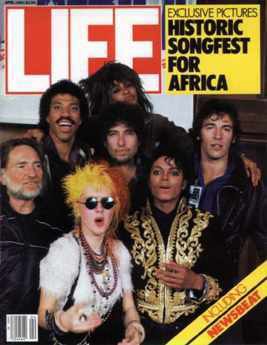
Part of a series on collaborations that we now take for granted but initially made little sense.
In November of 1984, Band Aid, an impromptu UK super-group organized by former Boomtown Rat Bob Geldof and pop mercenary Midge Ure, released “Do They Know It’s Christmas?” The charity single, intended to aid the famine in Ethiopia, sold 3.5 million copies, making it the biggest-selling UK single until “Candle in the Wind ‘97.” The song’s massive success showed that there were sound commercial reasons for marrying pop music to charity causes, a now-familiar union. In this, it preceded, but was ultimately eclipsed by, the American iteration: USA for Africa’s “We Are the World.” Recorded in January of 1985, the single sold 20 million copies worldwide, a pop phenomenon on a scale unthinkable today. As a song, “We Are The World” is difficult to defend. But as a cultural event it has almost certainly been undervalued, its treacly melody and trite lyrics obscuring any lessons we might learn from it. Pop and politics are in constant conversation, but what happens when they actively collaborate? Who wins, and who loses? And are pop’s intrusions into the political realm always regrettable — or can pop culture accomplish things traditional politics simply can’t?
“We Are the World” is one of those things that looks great on paper. Consider the personnel: Bob Dylan, Ray Charles, Willie Nelson, Paul Simon, Stevie Wonder, Diana Ross, Bruce Springsteen, Smokey Robinson, Bette Midler, Waylon Jennings, Tina Turner, Lindsey Buckingham, Hall & Oates, dot dot dot, Dan Ackroyd. This lineup outshone even the one assembled in the UK for “Do They Know It’s Christmas,” which sported a few enduring stars (Paul McCartney, David Bowie, Sting) but consisted primarily of the full lineup of synthpop groups of varying quality (Duran Duran, Spandau Ballet, Bananarama). And the above-named luminaries merely made up USA for Africa’s chorus. The group’s principals were some of the biggest stars on the planet: Lionel Richie, Quincy Jones and the man in the glass booth himself, Michael Jackson.
The mega-ness of Michael Jackson in 1985 is hard to overstate. On his way to being crowned the King of Pop, Jackson was much more than just a pop star; he was America’s kindler and gentler, moonwalking ambassador to the world, a secular religious figure in the making. Jackson’s clout was what made it possible for pop and politics to come together and collaborate. Moreover, his involvement in USA for Africa helped shield the project from charges of self-interest. The major criticism of charity singles was that they weren’t about charity at all — see Chumbawamba’s “How to Get Your Band on Television” from their album-length riposte to Band Aid, Pictures of Starving Children Sell Records. But such a criticism was hard to level at USA for Africa. In 1985, after all, Michael Jackson was in no need of publicity. Sitting between Thriller and Bad, and only seven months after being personally handed an (in retrospect, regrettable) award from the President of the United States, it’s hard to think of any way he could have made his public image more glowingly positive than it already was.
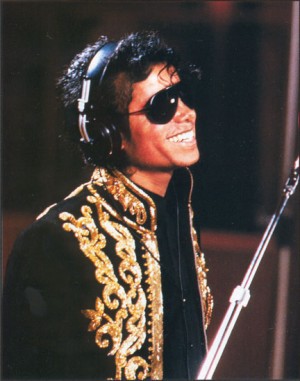
It’s worth considering the possibility that he and all the other artists involved (well, most of them) really just did it because they wanted to help people. Jackson seemed genuinely stricken by, and concerned about, the famine in Ethiopia, and for all intents and purposes, he became a political activist on the matter. That neither he nor almost any of the other artists involved (Senator Kenny Loggins, Secretary Tito Jackson) are recalled primarily as political figures today is a reflection of the legacy of “We Are The World.” As a political action, it was mostly a failure. But as a pop event, it was a resounding success. The former should not overshadow the latter. Pop does something for us that politics simply can’t. It provides that feeling of unity, of togetherness that must ultimately precede any political action. And even if Michael Jackson couldn’t give that to Africa, he most certainly gave it to the United States.
You may recall George W. Bush’s post-reelection declaration that “I earned capital in the campaign, political capital, and I intend to spend it.” Putting together “We Are the World” was Jackson spending the artistic capital he’d accrued over the three years between Thriller the album, “Thriller” the video, and that first moonwalk on “Motown 25.” Taken together, these achievements granted Jackson a functional authority, and he used the credibility he’d built up to vouchsafe the otherwise-questionable enterprise of gathering together artists from a bunch of genres and singing a song about African poverty.
As recounted in the documentary We Are the World: The Story Behind the Song and a 1985 LA Times article by Robert Hilburn, the work proceeded in much the same way a Congressional negotiation might: phone calls were made; the particular preferences of individual representatives were considered; favors were called in through a network of power and influence. It was Harry Belafonte, a longtime activist, who, following the success of Band Aid, conceived the idea and used his connections to pull something together. Belafonte brought in an artist manager named Ken Kragen, who recruited two of his clients (Richie and Kenny Rogers). Once Jackson expressed interest, his influence radiated outward and star after star signed on. When the American Music Awards brought everyone to Los Angeles, in January of 1985, the rest came together.
Though the level of talent present was good news for the cause, it caused a lot of worry for the organizers, who had to keep the project’s details under wraps (in contrast to Geldof, who had made the recording of “Do They Know It’s Christmas?” a media event in the UK). Said Kragen: “The single most damaging piece of information is where we’re doing this. If that shows up anywhere, we’ve got a chaotic situation that could totally destroy the project. The moment a Prince, a Michael Jackson, a Bob Dylan — I guarantee you! — drives up and sees a mob around that studio, he will never come in.” Quincy Jones, Jackson, and the rest of the production team prepped carefully, determining the pair-up of soloists in advance and sending off demos with the admonition to “check all egos at the front door of the studio.” As Hilburn reported, “When the soloists began arriving at the studio around 10 p.m., they found their names written on pieces of tape on the floor.”
The team also flew Geldof over to lend the project a sense of continuity with “Do They Know It’s Christmas?” and highlight the importance of the cause. Geldof said he “was pissed off” that he “had to call them in the first place. After they heard what we did with Band Aid, they should have been calling me. I don’t care what they had to do, even if it meant canceling shows. Lives are at stake.” This annoyance, however, didn’t stop the organizers from using him strategically; the session started with “a moving talk by Geldof, who had just returned from a visit to Ethiopia and reported on the suffering there.” Sufficiently chastened, the assembled gentry mostly cooperated.
While the cameras helped to keep egos in check, they also caused problems. According to Hilburn, the first time through the chorus, the men in the group, discovering the key was too high, strained to reach the notes. Given the presence of cameras in the room, this meant that some of the biggest pop stars in the world would be caught on tape singing off-key. Jones had to “diplomatically” suggest the ones having trouble should just not sing for that take. This worked in the moment, but dissent began fomenting during the break. “A few of the men — including Waylon Jennings, Kenny Rogers, Willie Nelson and Bruce Springsteen — retreated to the far side of the room until Jones called for a more manageable register. After Jennings looked over and saw that Nelson, too, had bailed out, the old outlaw pals from Texas broke into laughter.”
Other problems presented themselves but were dealt with diplomatically. As EW reported:
This harmonic convergence nearly fell apart, however, when Stevie Wonder announced the chorus would sing a line in Swahili. Some of the country singers were fit to be tied. Waylon Jennings walked out and didn’t come back. Finally a line in English was used instead. At 4 a.m. two Ethiopian women were escorted into the studio. ‘’Thank you on behalf of everyone from our country,’’ one of them said. Almost everybody wept.
The single and album were successful on a scale that’s hard to fathom today. Twenty million sales of the single worldwide, the fifth highest-selling single of all time and the fastest-selling single in US history. It won four Grammys, two VMAs, and was considered so important that the American Music Awards didn’t even allow it to compete that year. Instead, it was given two honorariums and taken out of the competition. It was inarguably the biggest pop-culture event of 1985, and you can still see its legacy today, if primarily in comedic terms.
As a political action, though, it was less successful. The USA for Africa Foundation did its best, converting donations into a long-term fund. (For some reason, the foundation also flew Belafonte over to Sudan with a planeload of food, medicine and t-shirts.) But the $10 million or so earned from record sales isn’t much compared to the amount needed to stabilize an out-of-control national infrastructure — by way of comparison, Ethiopia received $1.6 billion in foreign aid in 2001. Even taking inflation into account, ten million, while a nice gesture, wasn’t going to be able to accomplish much.
You could say the larger purpose of the project was to raise awareness of the issue. But even in this regard it’s hard to find much to praise. “One hundred years after Africa was divided up by the European colonial powers, the continent is in a state of permanent crisis,” begin the liner notes of the USA for Africa LP, and, while that’s true, it glosses over more recent, and more relevant, history. The crisis in Ethiopia wasn’t just a drought — but a famine, which is to say something caused through human action. Concurrent with the crop failure was a Cold War proxy battle between US-backed rebels and Soviet-backed government forces, a war that consumed a near-majority of the country’s GDP, crippling funding for health care or agricultural planning and making distribution of relief exceedingly difficult. People weren’t just starving because they didn’t have food, in other words. They were starving because the foreign policies of two countries made it very hard for them to have food at all.
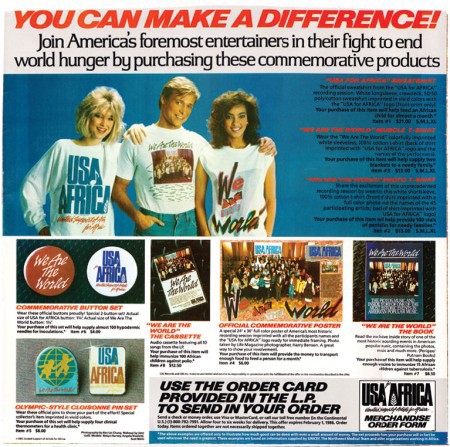
And as was pointed out at the time, this was not a problem “We Are the World” seemed interested in addressing. Even worse, the project didn’t just ignore this issue — it actively worked to mask it. Though their political purpose was ostensibly to raise awareness of the larger issues leading to famine in post-colonial countries, USA for Africa’s materials actively diverted attention away from these issues, holding out false hope of what individuals could accomplish. An insert included with the album, for instance, offered various merchandise the home consumer could purchase, and after describing a $21 USA For Africa sweatshirt as “White, longsleeve, 50/50 poly/cotton,” the insert declares: “Your purchase of this item will help feed an African child for almost a month.*”
Note the asterisk. It links to a brief disclaimer: “The net proceeds from your purchase will in fact be used wherever the need is greatest.” This shades the truth. USA for Africa was ultimately uninterested in raising awareness of issues about resource allocation in Ethiopia, foreign policy in America or humanitarian aid worldwide. What they were selling instead was a pop-music model of support. Under such a model, you don’t mess around with proxies, parties or representatives, budgets or planning — none of that. You find the thing you like and support it directly, and by so doing, you allow it to succeed. USA for Africa wanted us to vote for feeding African babies in the same way we voted for Michael Jackson to become King of Pop: with our dollars.
Politics doesn’t work like that. Declaring something to be true does not make it so; desire by itself is insufficient, and simply donating money to feed a starving child is only the first step in a long, unlikely process of getting food to a single child. But you can see why someone like Jackson would want to try. Here is a guy who, through concerted effort, had been able to achieve unthinkable heights of fame; it’s only understandable that he might have thought he could literally do anything that relied on bringing people together. Simplifying, cutting to the moral quick, exuding empathy: these had all worked for him before. Jackson named his charity “Heal the World,” after all. Not “Help the World,” but Heal it, as in fix it completely. It’s like naming something the Committee To Make Everything Perfect Forever. It’s impossible to accomplish the stated purpose, but it’s also hard to argue against.
And that’s precisely why it’s important to keep pop and politics operationally separated. Politics is the gathering and deployment of resources, the process of finding collective ways to solve practical problems. Pop is the collectivization and activation of sentiment, the best way we have in a secular world to inject higher meanings into our daily lives. Both are entirely necessary for our continued existence, but to pursue the purposes of one realm in the other’s space makes for trouble, as when we look to politics to validate our collective identity or to pop culture to show us that YOU CAN MAKE A DIFFERENCE in a real-world situation rather than just the world the audience creates for itself. What we can take from the small failure and large success of “We Are the World” is a lesson in why pop culture can be so powerful. It can’t get much done, because it’s bad with material realities. But this limitation is also freeing. In pop culture, a thing’s meaning is whatever we decide it means. And that can be dangerous sometimes, sure. But as a repository for our unquenchable thirst for beauty, for our eternal desire to lie in the light of grace, it’s awfully useful.
Jackson’s kingship is no idly proclaimed title. In his ability to stand for the soul of a nation, to be the head of state, he stood unquestioned, and he achieved this position not through birthright or blood feud but by making music. How strange that is, and how lovely: for a time, America was represented not by some old fart with a crown but by a man who could sing and dance very, very well. It’s easy to stand here and complain about pop’s ineffective forays into feeding the hungry or changing the world. But it seems more useful, to me, to think instead about how pop already does make the world a better place without necessarily trying.
Mike Barthel has a Tumblr.
